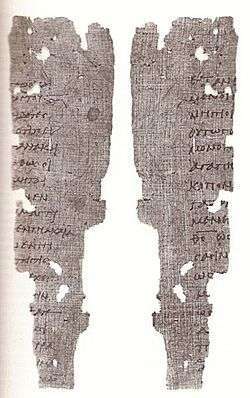1 Thessalonians 2
| 1 Thessalonians 2 | |
|---|---|
 Fragments showing First Epistle to the Thessalonians 1:3-2:1 and 2:6-13 on Papyrus 65, from the third century. | |
| Book | First Epistle to the Thessalonians |
| Bible part | New Testament |
| Order in the Bible part | 13 |
| Category | Pauline epistles |
1 Thessalonians 2 is the second chapter of the First Epistle to the Thessalonians in the New Testament of the Christian Bible. It is authored by Paul the Apostle, Silas, and Saint Timothy.[1][2]
Text
- The original text is written in Koine Greek.
- Some most ancient manuscripts containing this chapter are:
- Papyrus 46 (ca. AD 200; extant: verses 1-3)
- Papyrus 65 (3rd century)
- Codex Vaticanus (AD 325-350)
- Codex Sinaiticus (AD 330-360)
- Codex Alexandrinus (ca. AD 400-440)
- Codex Ephraemi Rescriptus (ca. AD 450; extant: verses 1-8)
- Codex Freerianus (ca. AD 450; extant: verses 7-9, 14-16)
- Codex Claromontanus (ca. AD 550)
- This chapter is divided into 20 verses.
Structure
This chapter can be grouped (with cross references to other parts of the Bible):
- 1 Thessalonians 2:1-12 = Paul’s Conduct
- 1 Thessalonians 2:13-16 = Their Conversion
- 1 Thessalonians 2:17-20 = Longing to See Them
Verse 10
- You are witnesses, and God also, how devoutly and justly and blamelessly we behaved ourselves among you who believe;[3]
- Ye are witnesses, and God also
Not so much to what goes before as to what follows after, relating to their holy walk and conversation among them, the more open part of which they were witness of; and for the more secret part God is appealed to, who is acquainted with the springs of actions, as well as with actions themselves:[4]
- how holily, and justly, and unblamably we behaved ourselves among you that believe.
The Syriac version joins the last clause of the preceding verse with this, and reads the whole thus, "ye are witnesses, and God also, how purely and justly we preached unto you the Gospel of God, and how unblamable we were among all that believed"; referring the former part to the purity and integrity in which they preached the Gospel, and the latter to their unblemished conduct among the saints; but the whole of it refers to their conversation, which was holy, externally holy, arising from internal principles of holiness in their hearts, and free from that impurity and filthiness with which the false teachers were polluted; and confirms what is before said, that their exhortation was not of uncleanness: and it was likewise "just", they were righteous in the sight of God through the justifying righteousness of Christ, and in consequence of this lived righteously before men, and were injurious to no man's person nor property: and their conversation was also "unblamable"; not that they were, without sin, and so without blame in themselves, or without the commission of sin by them, or that they passed without censure in the world, for they went through honour and dishonour, through good report and bad report, and had all manner of evil spoken of them falsely for Christ's name's sake; but by the grace of God, they had their conversation among them that believed so, that there was nothing material to be alleged against them, or any just cause of blame to be laid either on their persons or their ministry; and which is mentioned for imitation.[4]
See also
- Jesus Christ
- Judea
- Philippi
- Other related Bible parts: Luke 1, 1 Corinthians 4, Galatians 1, 2 Timothy 4
References
- ↑ Halley, Henry H. Halley's Bible Handbook: an abbreviated Bible commentary. 23rd edition. Zondervan Publishing House. 1962.
- ↑ Holman Illustrated Bible Handbook. Holman Bible Publishers, Nashville, Tennessee. 2012.
- ↑ 1 Thessalonians 2:10
- 1 2 John Gill's Exposition of the Entire Bible, - 1 Thessalonians 2:10